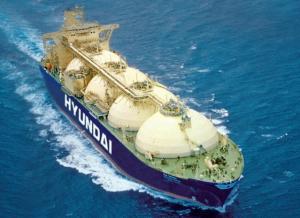
A search for a new owner for Hyundai LNG Shipping is accelerating. Hyundai LNG Shipping is Korea’s No. 1 company in shipping liquid natural gas (LNG). As major shipping companies in the United States and Europe are emerging as candidates for the acquisition of Hyundai LNG Shipping, the shipping company is highly likely to be sold off to an overseas buyer.
The process to sell off Hyundai LNG Shipping is accelerating according to sources in the investment banking (IB) industry on March 23. IMM PE and IMM Investment Consortium own a 100 percent stake in the shipping company.
While a large number of global shipping companies and related companies participated in a preliminary tender earlier this month, the seller has narrowed candidates down to five foreign companies, including those in the United States, the United Kingdom, Greece and Denmark. Previously, it was reported that about 20 strategic investors (SIs) and financial investors (FIs) around the world showed an interest in the acquisition of Hyundai LNG Shipping by signing non-disclosure agreements (NDAs).
Demand for eco-friendly ships is on a sharp rise around the world. As the main candidates are planning to expand LNG transportation in Asia with Korea as their base, the bidding war is heating up. The sale price discussed in the market is between 600 and 700 billion won (US$465-543 million).
The predecessor of Hyundai LNG Shipping is the Gas Carrier Division of HMM (formerly known as Hyundai Merchant Marine). When Hyundai Merchant Marine (HMM), which suffered from financial difficulties in 2014, put the Gas Carrier Division up for sale, IMM took it over for about 500 billion won (US$388 million) through a business transfer. Hyundai LNG Shipping accounts for the largest volume of LNG transportation for KOGAS.
In addition, all fleets of Hyundai LNG Shipping have long-term transport contracts of up to 20 years, so the company is relatively less affected by changes in global macroeconomic environments such as interest rates, exchange rates, and oil prices, and can stably generate profits.

